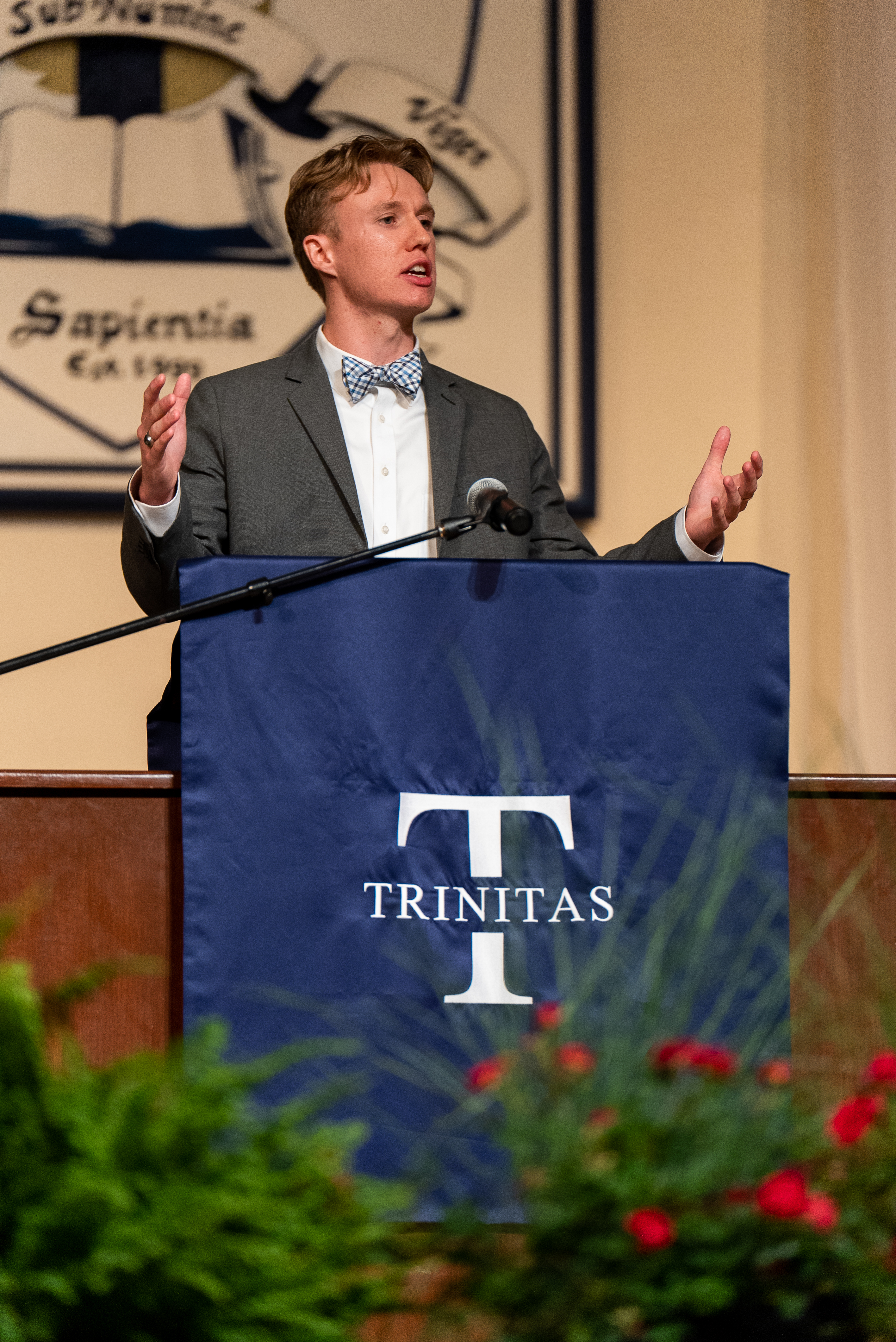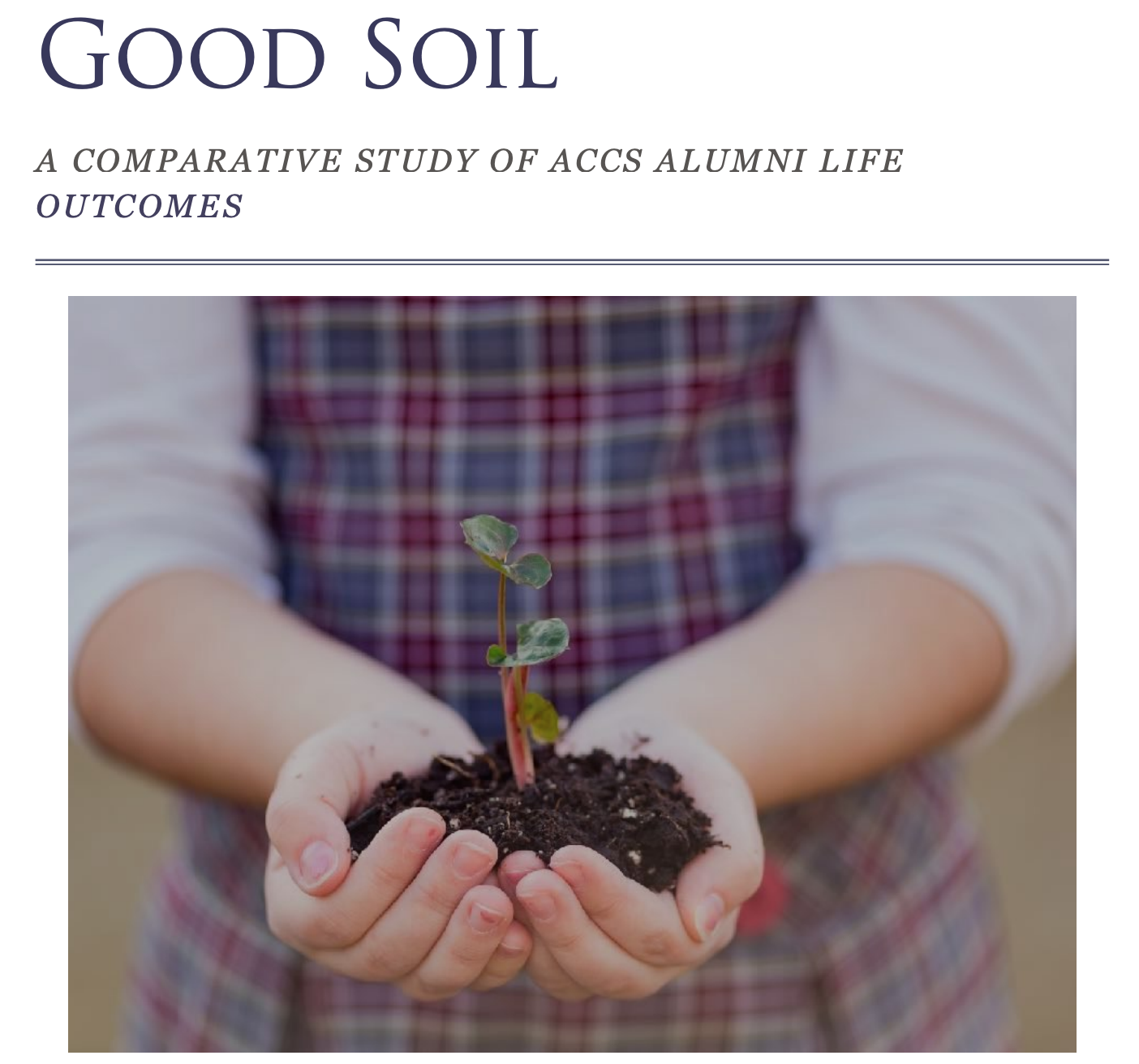Mathematics is one subject that is commonly taught in many classical Christian schools just as it is in other American schools. By adopting Calculus for Everyone: Understanding the Mathematics of Change by Dr. Mitch Stokes, Trinitas will be demonstrating to our students the importance of mathematics in the broader western culture, and in particular, to philosophy.
Thank you so much for that kind introduction. Before we begin, I would like to express my sincerest thanks to the administration and to all the senior class parents for providing me the opportunity to speak to these graduating seniors before you all tonight. And I would be terribly amiss if I did not congratulate you, seniors, on the many accomplishments that have brought you to this very place on this momentous evening. My purpose this evening is two-fold and somewhat paradoxical in nature. On the one hand, my job is to remind you that all of this evening is about you. On the other hand, my job is to remind you that none of this is about you, at all. Like I said, somewhat paradoxical. But there is a method to this madness, and I hope to demonstrate as much over the course of the next few minutes. There are many things I could say to you this evening; in truth, there are many things that ought to be said to you this evening, but that’s what all these good people are for. Lord knows I’ll need the backup. Yes, there are many paths we could tread, but I thought it best to stick to one rather familiar to you, and to me as well. Our progression this evening will follow a sort of timeline: First, we’ll revisit the past, taking great pains to put a very fine point on just what it is that you have been doing here at Trinitas for the past 6, 8, 10—and for some of you—13 years of your life; next, we’ll pause and ponder the precise precipice upon which you are perched, at present; and finally, we’ll look to the future, daring, even, to prescribe what must be next. So, let’s roll back the clock.
Topics: Classical Education, Alumni, Christian Education, College Admissions, Christian Living, Truth, Goodness, and Beauty, Virtue
Classical Christian Alumni are Better Prepared for College and Life - Part V
In his book Norms & Nobility, lifelong scholar and educator David Hicks asserts that right thinking ought to lead to right acting. The idea is that a proper education should lead one to think rightly about the world and everything in it, and that such thinking should be followed by actions that are in accord with it. Proverbs 23:7 comes to mind, “For as he thinks in his heart, so is he.” The passage refers to a miser or one who has an evil eye, but the principle also extends to the kind of people who are generous and don’t have evil eyes. It is just the way people work.
Topics: Blog Posts, Classical Education, Alumni
Classical Christian Alumni are Better Prepared for College and Life - Part IV
We live in an age wherein people are known by the ideologies to which they subscribe. I expect it has always been that way to some extent. People readily label other people. Labeling helps keep people sorted into neat categories so we know what we ought to think of them without bothering to get to know them. Racism is one of the first products of this labeling and sorting, but the sorting goes on ad infinitum and includes ideologies. It is the mark of an unthinking and unloving people. Possibly, it may merely appear more prevalent or more rancorous today simply because we have more and more sophisticated tools in this age with which to distinguish ourselves from those whose ideologies differ from ours. We frequently speak of our own country, for example, as one becoming more and more “polarized,” especially regarding politics.
Topics: Classical Education, Alumni
Classical Christian Alumni are Better Prepared for College and Life - Part III
No matter where we American Christians get our news these days, it seems to forebode the end of the world as we know it. The values many of us were raised with and still cling to are at best a fading part of the American Family’s core values. During the latter third of the twentieth century, a movement was launched that we generally refer to as the “sexual revolution,” and it was predicted to undo society to put it mildly. Whether what we are witnessing now is that undoing or we are being undone by something else is difficult to discern; that we are coming undone, however, seems clear.
Topics: Classical Education, Alumni, Christian Education
Classical Christian Alumni are Better Prepared for College and Life – Part II
When the world measures the outcomes of a K-12 education, it most frequently does so in terms of grades, test scores, and college scholarships. That is the vernacular. When the conversation turns to what kind of schooling produces the best of those outcomes, the world naturally assumes prestigious college preparatory schools are best. But that simply is not true. To push back even further, it might be said that the world is measuring the outcomes of education all wrong. What if I told you there is now definitive proof schools that measure outcomes in terms of soul formation also produce the best grades, test scores, and college scholarships?
Topics: Blog Posts, Classical Education, Alumni, College Admissions, Virtue
Classical Christian Alumni are Better Prepared for College and Life – Part I
One of the biggest shocks of my parenting life came nearly two decades ago when a wise, gray-haired teacher confessed to me that she did not care about my son’s grade. The conversation was about his grade in some grammar school subject that was just low enough to prevent his earning an academic award if something did not change soon. I swooned at her remark. All I could think of was my child’s future. How would he get into a good college and then on to a good career if he couldn’t get all A’s in second grade?
Topics: Blog Posts, Classical Education, Alumni, College Admissions, Virtue
This week we are continuing our series about the goals of classical Christian education and the pathway to reaching them. Last week we started talking in earnest about that pathway. I suggested there are four key elements in the classical Christian model that make up the pathway. This week we take up the third and fourth elements: a structured and orderly learning environment and a Christ-centered community of like-minded families.
Topics: Blog Posts, School Life, Parenting, Classical Education, Christian Education




%20copy.jpg)

